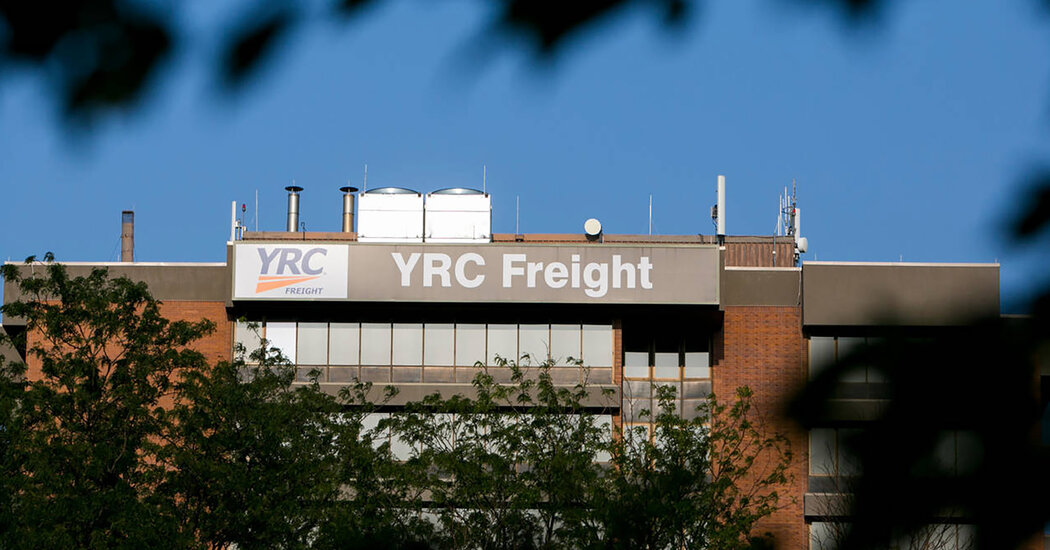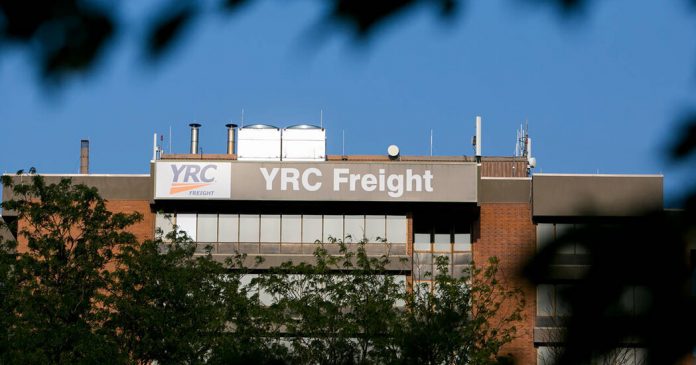
WASHINGTON — At a virtual congressional hearing in May, Senator Jerry Moran, Republican of Kansas, asked Treasury Secretary Steven Mnuchin for help. A struggling trucking company in his state was on the brink of collapse and needed government support.
Eager to assist, Mr. Mnuchin assured the senator that “we will look at that specific company and see what we can do and get back to you.”
That company, YRC Worldwide, had lost more than $100 million in 2019 and was being sued by the Justice Department over claims it defrauded the federal government for a seven-year period. But six weeks after the hearing, YRC received a bailout from the Treasury Department — a $700 million loan in exchange for a 30 percent stake in the business. The company’s stock price soared 74 percent, though it has come down since.
The rescue, which was approved on the grounds that YRC was critical to national security, made the company one of the largest recipients of taxpayer money meant to support businesses and workers struggling amid the coronavirus.
It has also raised questions about whether YRC benefited from a web of connections between the company and the White House that allowed it to bypass the Trump administration’s own rules for which companies should be eligible for federal help.
YRC has financial backing from Apollo Global Management, a private equity firm with close ties to Trump administration officials. In 2019, a group of funds managed by affiliates of Apollo lent YRC $600 million. In April, President Trump tapped YRC’s chief executive, Darren Hawkins, to serve on a coronavirus economic task force and in January, he nominated the company’s former chief executive, William Zollars, to the United States Postal Service’s board of governors.
The loan has come under scrutiny from the Congressional Oversight Commission, a bipartisan panel created by Congress to police stimulus funds. Last month, the commission opened an inquiry into whether the company, which ships meal kits, protective equipment and other supplies to military bases, was really worthy of a rescue.
YRC’s loan came from a discrete $17 billion pot of money set up by Congress and controlled by Mr. Mnuchin to help companies that were designated as critical to national security. It was the first company to receive a loan from that fund.
The company has said the loan will be used to pay pension and health care costs and to invest in trailers and trucks.
For months, the money went untouched, in part because the loans come with strict terms and requirements and corporations must be willing to hand over equity stakes in their companies to the federal government. To be eligible, most companies are supposed to have government contracts that involve emergency preparedness functions or top-secret facilities. The Treasury Department submits all applications that do not meet those criteria to the Defense Department for review.
That is what the Treasury Department did with YRC’s application, saying in a news release that the approval for the loan “was based on a certification by the secretary of defense that YRC is critical to maintaining national security.”
A July report from the Congressional Oversight Commission raised questions about the decision to grant the loan, asking why delivering food to bases was vital for national security and why the Treasury Department appeared to seek special signoff from the Defense Department to ensure that YRC was considered eligible. The panel, which was created as part of the legislation that was signed in March to oversee distribution of $2.2 trillion in federal virus relief, said it found the agreement questionable and predicted that the government could end up losing money on the deal given the company’s precarious financial position.
Some members of the commission also want to look into whether YRC’s relationship with Apollo influenced the approval of the loan, according to a person familiar with the matter. No decision has been made about moving the inquiry in that direction. The commission, which will hold its first hearing on Friday morning, has the power to request documents, call witnesses and coordinate with other congressional committees on oversight matters.
The loan has raised questions of favoritism in part because it appears to flout the Trump administration’s own public assertions that it would not use taxpayer money to prop up individual companies or bail out businesses that were in financial trouble before the pandemic struck. The YRC loan appears to be an exception.
“YRC was already in a precarious position given that they weren’t a very profitable company, they were already losing volume and market share, and they’ve been trying to turn this around forever,” said David Ross, an analyst at the investment firm Stifel. “In normal times when you have a recession, companies that aren’t the best companies go away.”
The relationship between Apollo and the White House runs deep. In 2017, Josh Harris, a founder of Apollo, advised the Trump administration on infrastructure policy and discussed a possible White House job with Jared Kushner, Mr. Trump’s son-in-law and senior adviser. That same year, Apollo lent $184 million to Mr. Kushner’s family real estate firm, Kushner Companies, to refinance the mortgage on a Chicago skyscraper.
Since the pandemic, Apollo has been lobbying the Trump administration to allow broader access to an emergency Federal Reserve lending program.
The government lifeline to YRC was a boon to Apollo, which might have been faced with liquidating its decaying trucking assets if the company was forced to close.
Apollo, which is YRC’s biggest creditor, said it was not involved in YRC’s decision to seek the Treasury Department loan and noted that it is one of several lenders invested in company. However, a spokeswoman acknowledged that it was advised of the government loan and made changes to its own loan terms with YRC to accommodate it.
Mike Kelley, a YRC spokesman, declined to comment.
The Treasury Department declined to explain why it determined that YRC was worthy of a loan. In announcing the decision on July 1, Mr. Mnuchin said, “This loan will enable a critical vendor to the Department of Defense to maintain significant employment while providing appropriate compensation to taxpayers” and estimated that 30,000 trucking jobs would be saved. A Defense Department spokesman referred questions to the Treasury Department when asked why YRC was critical to the country’s security.
YRC’s relationship with the government has not always been cozy. In 2018, the Justice Department sued YRC, accusing it of overcharging and defrauding the Defense Department out of millions of dollars over a seven-year period. Prosecutors said YRC inflated the weights of thousands of shipments, billing the government based on those false numbers in what was described as “an affront to American taxpayers.”
YRC attributes the complaint to an old contractual dispute and says it has a motion for dismissal pending.
YRC’s fortunes have been fading for years, beginning in 2009 when two of its shipping competitors, FedEx and Conway, engaged in a price war in hopes of driving it out of the market. Last year it posted a net loss of $104 million. As of the end of March it had $880 million in outstanding debt.
Analysts attributed its financial malaise to a long period of mismanagement and neglect of its fleet of trucks.
Amit Mehrotra, a Deutsche Bank analyst, said that YRC’s fleet was twice as old as the industry average and that many of its competitors had been thriving despite the economic upheaval, suggesting that the pandemic merely accelerated the company’s demise. Although it would be inconvenient for the Defense Department to terminate its contract if YRC went out of business, he said, there are plenty of capable alternatives in the shipping market.
“Their crisis is not a product of Covid,” Mr. Mehrotra said. “Their crisis is borne of years and of under investment in their assets.”
As the pandemic shuttered large swaths of the U.S. economy this spring, freight volumes at YRC fell sharply. The company began shedding workers, delayed payments to health funds for its union workers and, in late April, applied to the federal government for financial assistance. Moody’s Investors Service cut the company’s ratings and Mr. Ross, of Stifel, halted estimates of its earnings, noting the high degree of uncertainty facing the company.
“Will YRC live to fight another day?” Mr. Ross wrote in a note to clients in May.
To government watchdog groups that have been tracking the Trump administration’s economic relief effort, the real question is whether a company such as YRC should live on. That is especially pertinent when difficult choices are being made about extending unemployment insurance and funding schools with personal protective equipment.
“It sends a chilling message to the American people that the Trump administration has no problem throwing nearly a billion dollars to wealthy, well-connected companies like YRC, while they refuse to provide adequate assistance for the unemployed or protect workers as the pandemic worsens,” said Kyle Herrig, the president of Accountable.US.
The post Rescue of Troubled Trucking Company With White House Ties Draws Scrutiny appeared first on New York Times.







